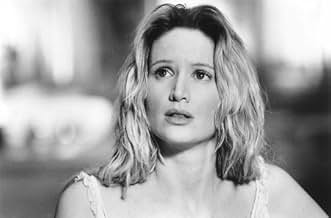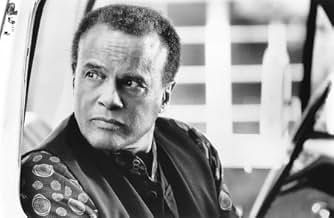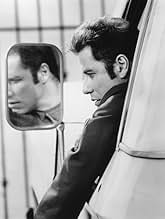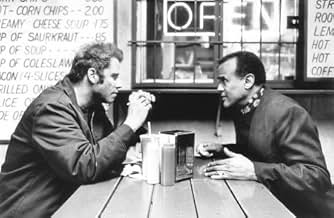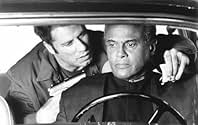Ajouter une intrigue dans votre langueIn an alternative America where African-Americans and White Americans have reversed cultural roles, a white factory worker kidnaps a black factory owner for dismissing him over perceived dis... Tout lireIn an alternative America where African-Americans and White Americans have reversed cultural roles, a white factory worker kidnaps a black factory owner for dismissing him over perceived disdain.In an alternative America where African-Americans and White Americans have reversed cultural roles, a white factory worker kidnaps a black factory owner for dismissing him over perceived disdain.
- Réalisation
- Scénario
- Casting principal
- Sheriff #1 at Eviction
- (as Lawrence Mandley)
Avis à la une
Strangely I'd forgotten all about this movie until it was broadcast on BBC1 a couple of nights ago and it's not difficult to understand why it's an obscure flop . The film starts with a black family gathered at the dinner table where patriarch and businessman Thaddues Thomas states his dislike for white people and their problems . Cut to Louis Pinnock who who works for Thomas company and lives in a rough area where his neighbours all seem to be pecker woods . Later due to a series of contrived , not very well written circumstances Pinnock loses his job with the company and decides to kidnap Thomas
The problem with WHITE MANS BURDEN is that this is an alternative world where Black Americans are at the apex of social hierarchy while whites are at the bottom bu this scenario is never ever explored . In fact the only things were shown that things are so mightily different is when someone is flipping the TV channel that show amongst other things a western where all the calvarymen are black . I know this was made in 1995 but is director Desmond Nakano saying there's no white equivalent of Morgan Freeman , Condaleeza Rice or Colin Powell ? For goodness sake we're even shown a black golfer on TV . Is this version of America without a white golfing prodigy called Alpine Woods ?
So that's the main problem and an unforgivable one where we're told that everything is different but as the plot rolls along we find ourselves asking what is actually different ? The audience are shown a couple of black cops being confronted by an angry white mob ( This doesn't happen in " our " America ? ) , a white man with a black companion are threatened by pecker woods ( This doesn't happen in " our " America ? ) etc , etc . At no point is the premise used to explore how anything would be different in " our " America . If you made a film set in " our " America where a disgruntled white employee kidnaps his racist black boss then you would not have to alter one single word never a single scene from this screenplay . And disgruntled employees kidnapping nasty employer type redemption plots we never all that compelling in the first place
From the opening I felt chills. Was this chocolate factory scene, brown being poured on top of white, some horribly clumsy use of imagery? I feared so. The film looked set to be heavy-handed, and it was. The movie's flaw is that it over-does it's premise - nearly all the white people are poor and rundown, while all the black people come across as elitist snobs. The underlying message of course being that in "our reality" the situation is reversed and this gives a horribly, simplistic, and downright irritating attitude towards race. It's completely simplistic and infuriating - not because you're angered that it's right but because it's done so poorly and with a preachiness that grates.
It might all be OK if there was a story to support it. There isn't. Reeking of TV movie-of-the-week, John Travolta is playing a desperate factory-worker who kidnaps his ex-boss in a bid to get the money he lost from being fired unfairly. *Yawn*. There's no suspense and no tension in their scenes. There's the boring, trite situation where the boss, played by Harry Belafonte, starts to understand Travolta's cause. Far too obvious in coming. There's even the hilariously poor moment when Belafonte's son takes home a white girl to a look of distaste from his mother - bang that message-hammer on our heads Mr Nakano (the script writer). I'm reminded of a moment from "Don't Be a Menace to South Central While Drinking Your Juice in the Hood" when the character is similarly preachy and the postman turns to the screen and says "Message!" pointing out how morale messages are weakly delivered. In fact the only decent bit is about two minutes from the end, and even that's ruined by the (incredibly) obvious follow-up final minute. *Yawn*.
Travolta does nothing for this picture. This film was released after his sudden re-emerge in "Pulp Fiction", but I imagine he made it while still wandering around the Turkey Farm. His performance is as forgettable, as is usual with him and Belafonte is just OK.
Nothing can make me recommend this piece. If you want a movie about race issues why not watch the infinitely superior "American History X". This movie has a dreadful plot, weak acting, and destroys a promising premise by being both heavy-handed and insultingly simplistic. Avoid. 2/10.
Le saviez-vous
- AnecdotesDesmond Nakano, who is Japanese-American, created the film in part because of how we felt that to both American whites and blacks, he was "them". He also tapped into the disorienting feeling he felt when he visited Japan, saying that "for so long I had been different, [and] it felt wrong to be the same."
- GaffesToutes les informations contiennent des spoilers
- Citations
[Last lines. Mrs. Pinnock has just refused to accept from Mr. Thomas the money he owed her husband]
Thaddeus Thomas: Why don't you keep it? I can give you some more if you think... if you think it's not enough.
Marsha Pinnock: How much is enough, Mr. Thomas? How much will ever be enough?
[turns, shuts the door and walks away]
Meilleurs choix
- How long is White Man's Burden?Alimenté par Alexa
Détails
- Date de sortie
- Pays d’origine
- Langue
- Aussi connu sous le nom de
- L'impossible rançon
- Lieux de tournage
- Sociétés de production
- Voir plus de crédits d'entreprise sur IMDbPro
Box-office
- Budget
- 7 000 000 $US (estimé)
- Montant brut aux États-Unis et au Canada
- 3 734 870 $US
- Week-end de sortie aux États-Unis et au Canada
- 1 743 251 $US
- 3 déc. 1995
- Montant brut mondial
- 3 734 870 $US
- Durée
- 1h 29min(89 min)
- Couleur
- Mixage
- Rapport de forme
- 1.85 : 1




